Islamic History Podcast
We often overlook Islamic history as a learning tool. The history of Islam is not only important for Muslims, but important for everyone. Islam and the people who call themselves Muslims have made an enormous impact on our world. The Islamic History Podcast is about discovering that history in a fun and interesting way.
We often overlook Islamic history as a learning tool. The history of Islam is not only important for Muslims, but important for everyone. Islam and the people who call themselves Muslims have made an enormous impact on our world. The Islamic History Podcast is about discovering that history in a fun and interesting way.
Episodes

Friday Oct 27, 2017
The Slander Against Aisha
Friday Oct 27, 2017
Friday Oct 27, 2017
Aisha, the Prophet's wife, is the victim of salacious gossip and rumors. With no one else to help her, she realizes she can only rely on Allah. Meanwhile, Prophet Muhammad must work hard to keep his small community together. Even though the leader of the hypocrites, Abdullah ibn Ubayy, will do everything to make him fail. After the show is over, be sure to visit the Show Notes page. The Show Notes are available at: IslamicLearningMaterials.com/Ifk Here's some of what you'll find: The transcript for this episode Download of my recent Khutbah, Family and Faith Links to other related resources You can support the Islamic History Podcast by doing one (or more) of the following: Give a monthly pledge on Patreon Subscribe on iTunes Share with your friends and family You can do it all and more at the Show Notes page: IslamicLearningMaterials.com/Ifk

Monday Sep 04, 2017
3-10: Mecca And Medina
Monday Sep 04, 2017
Monday Sep 04, 2017
Instead of bringing peace, the Umayyad victory at Karbala brings even more instability to the Empire. Now the Muslims of Mecca and Medina are more determined than ever to shake off the Umayyad yoke.
In Mecca, Abdullah ibn Zubayr is quietly building his support. He refuses to openly oppose Banu Umayyah, but everyone knows he's up to something.
In Medina, Yazid is quickly losing his grip. Everything he does turns the Muslims of Medina against him even more.

Monday Jul 31, 2017
3-9: Sunnis And Shias
Monday Jul 31, 2017
Monday Jul 31, 2017
A brief overview of the similarities and differences between Sunni and Shia.
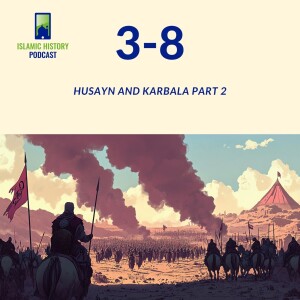
Monday Jul 17, 2017
3-8: Husayn And Karbala Part 2
Monday Jul 17, 2017
Monday Jul 17, 2017
Husayn and his group are trapped at Karbala. He tries to negotiate with Banu Umayyah, but it goes nowhere.
This episode explores one of the most tragic and pivotal events in Islamic history. With this episode, the political faction known as Shi'atu Ali become the Shia religious sect.
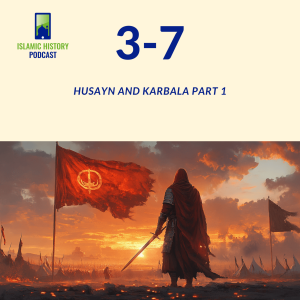
Monday Jun 19, 2017
3-7: Husayn And Karbala Part 1
Monday Jun 19, 2017
Monday Jun 19, 2017
Husayn is unaware of the fate of his cousin, Muslim ibn Aqeel, in Kufah. The last thing Husayn knew, the Shia in Kufah were waiting for him. With this knowledge, Husayn leaves Mecca with several members of his family, including women and children.
But things are not good in Kufah. Ubaydullah, the governor of Kufah, is ready for Husayn and has sent Umar ibn Sa'd ibn Abi Waqqas with an army of 4000 men to greet him.
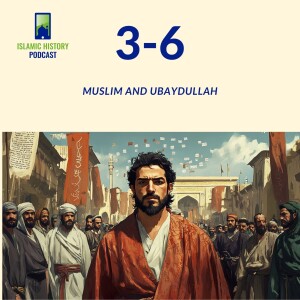
Tuesday May 23, 2017
3-6: Muslim And Ubaydullah
Tuesday May 23, 2017
Tuesday May 23, 2017
Husayn sends his cousin, Muslim ibn Aqil, to see if he really does have support in Kufah. However, Yazid ibn Muawiyyah also sent his ruthless governor, Ubaydullah ibn Ziyad. The two men struggle for the heart and soul of this troubled city.
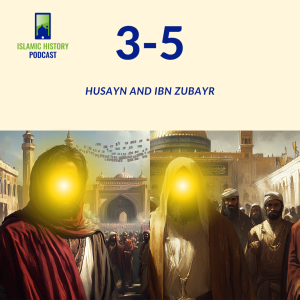
Monday Apr 17, 2017
3-5: Husayn And Ibn Zubayr
Monday Apr 17, 2017
Monday Apr 17, 2017
Muawiyyah dies and as planned, his son Yazid succeeds him as Caliph. But there are many people in the Muslim Empire who do not agree with this.
Two of them are Husayn ibn Ali and Abdullah ibn Zubayr. They refuse to give Yazid the pledge and flee to Mecca. Ibn Zubayr begins to build alliances there while Husayn is being courted by the people of Kufah.
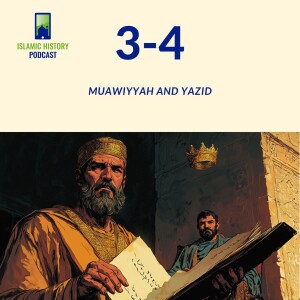
Monday Mar 27, 2017
3-4: Muawiyyah And Yazid
Monday Mar 27, 2017
Monday Mar 27, 2017
Muawiyyah and his administration have subdued the Muslim Empire. Most of Iraq has settled down and his detractors have fell silent. But Muawiyyah is concerned about the future. What's going to happen when he's gone?
The Caliph conspires with his governors to turn the Caliphate to a monarchy. Muawiyyah does not believe the old ways of choosing the next Caliph works. He believes it needs to become a family affair.
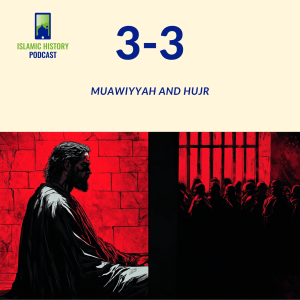
Monday Mar 13, 2017
3-3: Muawiyyah And Hujr
Monday Mar 13, 2017
Monday Mar 13, 2017
The Umayyads had the practice of cursing Ali during their sermons. Many of the party of Ali did not like that.
One of these men was Hujr ibn Adi, a companion and commander in Ali's army. When he heard the Umayyads cursing Ali, he would shout at them and to make them stop.
But Ziyad ibn Abihi, the governor of Kufah and Basra, would not tolerate such defiance. He decided to find Hujr and make an example of him for others
This episode chronicles the story of Hujr ibn Adi and one of the early incidents that led to the split between Sunnis and Shiites.
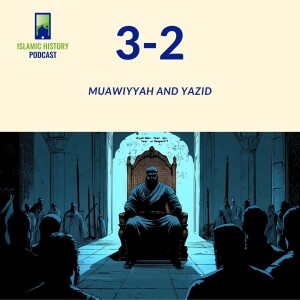
Monday Mar 06, 2017
3-2: Muawiyyah And Ziyad
Monday Mar 06, 2017
Monday Mar 06, 2017
Basra is starting to slip out of control with rampant crime and too much rebellion. Muawiyyah is ready to bring in someone new; however, this new guy has a scandalous past.
In this episode, we're introduced to Ziyad ibn Abihi, Muawiyyah's brutal governor of Basra. We'll see how Ziyad rises from obscurity to become the second most powerful man in the Empire.
Join the Islamic History Podcast Telegram group and search "3-2" to download this episode's transcript.

